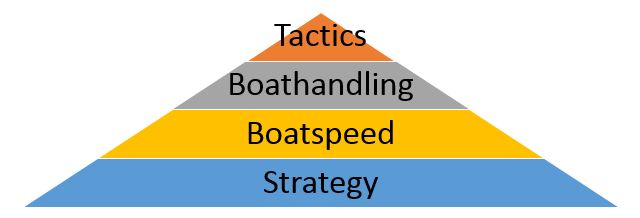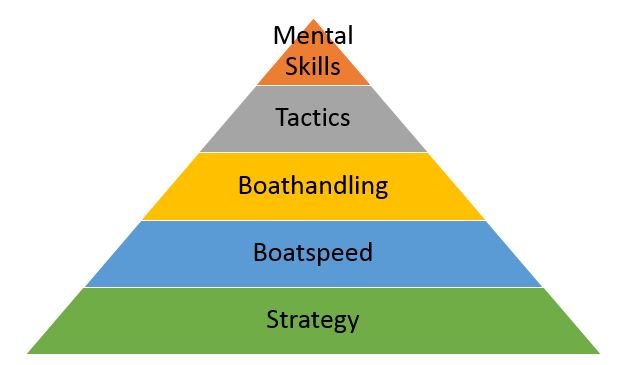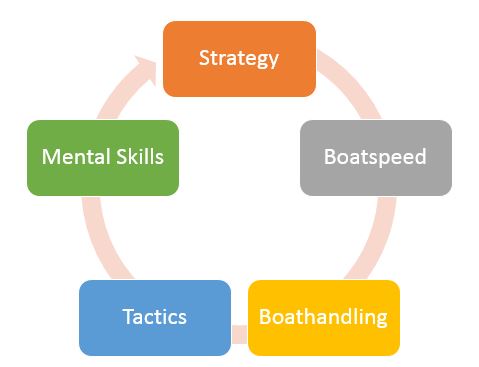Mental Training and the Performance Cycle
Published on October 3rd, 2017
Tim Herzog is a Licensed Clinical Professional Counselor, Certified Consultant with the Association of Applied Sport Psychology (AASP), and is listed in the United States Olympic Committee Sport Psychology Registry.
Tim also has coached sailing for many years, remains an active competitor, and in this report for the US Sailing blog, he discusses that piece of the performance puzzle which sets apart the best from the rest.
Fifteen years ago, as Hobart Coach Scott Ikle was launching the US Sailing Level 3 Certification program, he invited me to speak to a group of coaches at Annapolis Yacht Club, who were attending the Advanced Coaching Symposium. I gave a talk that was inspired, in part, by a Sailing World article that Betsy Allison had written describing a pyramid of what’s important in sailing performance. Betsy’s pyramid looked something like this:

One could debate, what belongs where in the pyramid, because all these ingredients affect sailing performance. Strategy is about knowing the fastest way around the race course in the absence of other boats; you have to go the right way! Boat speed is about making your boat go fast; you need to get there quickly! Boat handling is about good tacks, gybes, roundings, etc; you have to maneuver your boat well or you’ll stop! Tactics is about the “chess game” in smaller packs of boats.
No doubt that all these ingredients are important! My talk extended from Betsy’s model and emphasized something along the lines of this:

At the time, I viewed mental skills as being the final piece of the puzzle, or the thing that made a difference once all the other pieces were in place. Having worked with hundreds of athletes in sailing and other sports, my perspective has evolved.
Mental skills are not the elements to work on last. They are the pieces of the puzzle that fit in every step of the way! Mental skills that I commonly work on with athletes include the “Dirty Dozen”:
1) Knowing your Values
2) Understanding your Motivation
3) Engaging SMART Process focused goal-setting
4) Building Self-Talk Habits
5) Developing Routines for Mindful Attention
6) Utilizing Mental Imagery
7) Practicing Self-Attunement
8) Hanging in there with Anxiety Tolerance
9) Getting your needs met through Assertive Communication
10) Channeling your (negative) Emotions into positive effort
11) Staying the course with Energy Management
12) Using Anxiety Reduction (because you can, not because you have to)
I could write a dissertation about any of these topics (in fact, I did for #6!), but you get a quick sense of what these skills are all about- with a glance. And you can easily imagine how learning these skills earlier rather than later can translate into habits of excellence.
And so, I think an evolved model looks something more like this:

Each piece of the puzzle feeds off the other, in a continuous cycle. This is true both in terms of what’s needed during a race, and in terms of what’s important to train along the way. By utilizing mental skills along the way, you enable better/faster learning, and by utilizing mental skills during competition, you end up performing at a level that represents your true abilities.
We go through stages of learning whereby skills (physical or mental!) are developed in this sequence: 1) conscious step-by-step focus; 2) associations so things start to click out of habit; and 3) automatic/habitual responses when we need them. Somebody may be a world-class sailor and yet— if he/she succumbs to anxiety they might sail like a beginner, doing things like clumsily (and over-consciously) aiming to keep the boat flat in changing conditions.
To illustrate, let’s look at the same scenario through two extreme lenses: First time at a World Championship, without mental training versus having done mental training…
Without Mental Training:
You arrive at the event, and nerves lead you to think, “What am I doing here? I should be at home with my peers and family.” You wonder what place you’ll end up finishing and picture/fear the worst. You set goals like top 10, thinking “I have to finish top 10.” While racing, your mind keeps going to the numbers, who’s in what place, rather than noticing puffs and big shifts.
You’re anxious and alternate between being oblivious that you’re anxious and then wanting to fight the anxiety. Out of tune with yourself, anxiety transforms into anger as you tell your partner to “F— off!” You feel yourself giving up and feel energy slip away and you regret the fact that it was hard to sleep last night. You desperately want this day to be over.
Having Done Mental Training:
You arrive at the event, noticing your nerves and embracing them. You have clarity about why you are here; you thrive on pushing yourself. Thoughts of self-doubt come and go, without sticking – your brain is mostly quiet or focused on the task at hand.
You know you’ve put in the effort such that you can picture finishing in the top 10, but your dominant focus is effortlessly (out of habit) shifting from noticing your internal state, to strategy, boat speed, boat handling, and tactics. You’ve got concrete goals to focus on, technique or other elements that are within your control.
You notice anxiety ebbing and flowing, but feel equipped to accept and modulate it. You catch errors that you and your partner make along the way and find constructive ways to talk about them, during moments when it makes sense. You feel rested, energized, and ready. You find yourself excited to continue seeing how things unfold moment to moment.
Dirty Dozen
You can probably see how the Dirty Dozen come into play here. These skills aren’t developed overnight; why not learn them sooner rather than later? Stay tuned for future blog posts as we lay out each skill of the RAMP (Reaching Ahead Mental Performance) Dirty Dozen skills each month…
Source: US Sailing Blog









 We’ll keep your information safe.
We’ll keep your information safe.